Coronavirus: The NHS staff living away from homes and families
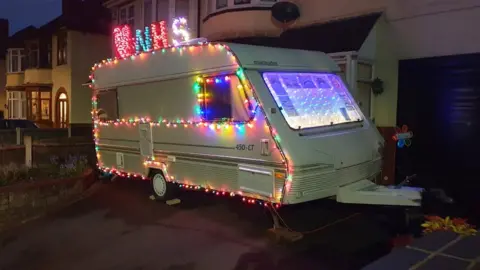 Sarah Link
Sarah LinkMany healthcare workers have made the difficult decision to live away from their families while they go to work during the coronavirus outbreak.
Some are living in hotels, others are in mobile homes or caravans. Four people explain why they felt they had to leave home while carrying out vital work for the NHS.

'I need to protect my son'
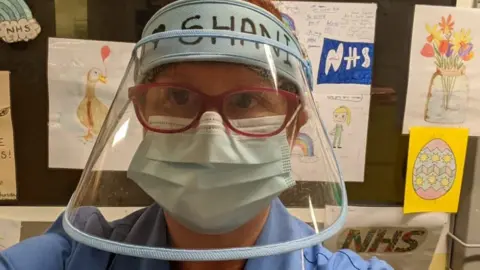 Shani Stocker
Shani StockerShani Stocker, a nurse from Worcestershire, has a 13-year-old daughter and an 11-year-old son who has an auto-immune condition. Her daughter has gone to live with relatives and, when the coronavirus outbreak started to affect hospitals in England, Ms Stocker made the decision to go and live in a caravan on the driveway of the family home.
"As a mother you miss hugging your kids, and my son has been through a lot in the last year. I don't see this as a negative, but it's something I need to do to protect my son.
"Yes this is difficult but I'm willing to do it, to help get people better.
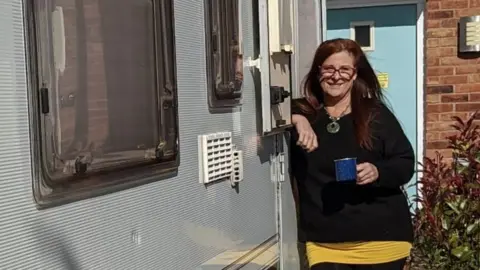 Shani Stocker
Shani Stocker"My 13-year-old daughter went to live with my niece, so she was out of harm's way, but my son is in active treatment, so I can't send him away. With his condition, no-one knows how he'll react, it's a rare disorder."
The 50-year-old infectious disease nurse described her caravan as "basic".
"I've hooked up some electric, and got one of those electric frying pans, there's a toilet and a sink and other bits and a double bed," she said.
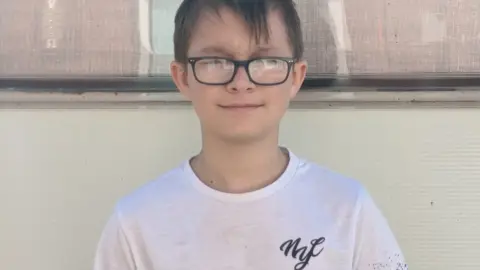 Shani Stocker
Shani Stocker"At first I was sleeping on the sofa [at home] but that meant my son had to stay in his bedroom, but you can't do that to kids. With me out of the equation it allowed him to be around the house.
"I just don't know if I'm bringing anything home, I just didn't want to run the risk of giving it my partner, I need him to look after my son."
Despite the situation, Ms Stocker said she had the best team at work, who were supporting each other and being "really positive".

'I'm very teary'
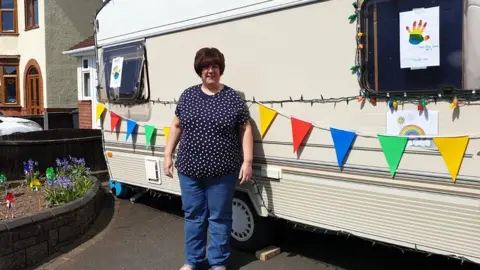 Sarah Link
Sarah LinkSarah Link is a healthcare assistant at the Queen Elizabeth Hospital, in Birmingham. She and her husband bought a caravan on the day the lockdown began and moved out of their home so her mother could stay in the house.
Mrs Link has worked in the NHS for 17 years, while husband Gary is a fishmonger who has still been making deliveries.
The basic amenities of the caravan prompted a neighbour to give her a key to their gate so she could use their outside shower and a toilet.
"Mum is cooking us our food, she puts it in the garage on paper plates and we take it back to the caravan," Ms Link said.
"Luckily we've got a washer and dryer in the garage so we go in there to do the washing, I disinfect the washer and dryer and we've got little radiators to dry things on. But it's absolutely freezing, I can see my breath some nights."
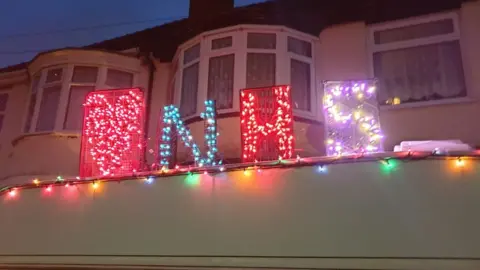 Sarah Link
Sarah LinkShe added: "The caravan faces the front door so me and mum wave to each other.
"We're really close, I lost my dad when I was 13, he was only 50, so we're a really close family and all look out for each other. That was why when this happened my first thought was I've got to keep mum safe - but this way I can still see her.
"I feel like I've got a window in front of me and I can see my old life but I can't get back to it. It's very, very hard, I'm very teary."

- A SIMPLE GUIDE: How do I protect myself?
- AVOIDING CONTACT: The rules on self-isolation and exercise
- HOPE AND LOSS: Your coronavirus stories
- LOOK-UP TOOL: Check cases in your area
- STRESS: How to look after your mental health

'It was a relief'
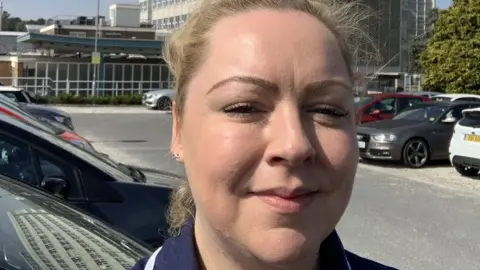 Jessica Atoklo
Jessica AtokloMidwife Jessica Atoklo stayed in hotels for two weeks to allow her to carry out front-line work for University Hospitals Birmingham. Although she normally has a non-clinical role, she offered up her time to help cover a short-fall of staff in other areas.
"Because my husband is high-risk, I felt uncomfortable being clinical and face-to face with patients, then running the risk of bringing anything home," she said.
"It was actually a relief to be able to go to work, go back and not have to worry so much. I have a 12-year-old son at home so I did feel really guilty being away from him."
Allow X content?

Ms Atoklo would use handwashing laundry detergent and soak her scrubs overnight in the hotel bath.
"Because I knew I was staying at the hotel, I worked loads, I told them to give me all the shifts and I would cover them all because there was no point in having a day off to sit in the hotel room," she said.
She has since returned to her usual role and will be supporting staff rather than working directly with patients, which has allowed her to move back home.
"I was so relieved," she said. "I had been starting to get a bit irritable, I was desperate to get home."

'Hotel owners are hidden heroes'
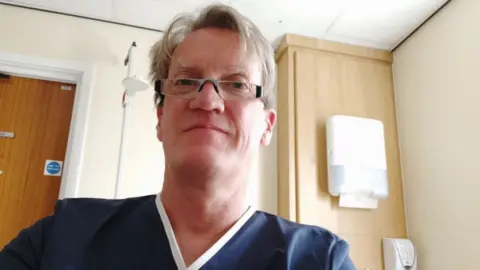 Ashley Liston
Ashley ListonDr Ashley Liston spent 30 years in Tyneside before relocating to Eden Valley in Cumbria four years ago.
He was due to retire as a GP at the end of March. But when the coronavirus outbreak happened he decided retirement was not an option.
"I offered my services in West Cumberland as they're really struggling to recruit GPs, it's a lovely area but just a bit out of the way," he said.
Dr Liston has been working in a red centre, dealing with patients who report Covid-19 symptoms. "It's an hour and a half's drive, so I said I'd rather do consecutive days and initially I was going to stay in my camper van.
"We'd sorted out a car park where it could stay and I would use the showers at the GP surgery. Then, my first day, I was told about a local hotel offering rooms and I got in touch and they said 'yeah you're very welcome' - and what a difference of having a comfortable bed."
And he was full of praise for the hotel owners.
"They're the hidden heroes, these people who have quietly offered to help. Coming back at the end of the day, watching some TV and sleeping well makes all the difference."

Follow BBC West Midlands on Facebook, Twitter and Instagram. Send your story ideas to: [email protected]
